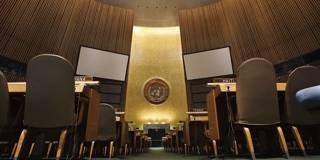UN Secretary-General António Guterres' call for networked and inclusive multilateralism is prompting a healthy and consequential rethink of global governance. Reforms in this area can help the UN system keep pace with a wide range of pressing international challenges.
QUITO/MADRID – Great-power competition, the troubling rise of xenophobic nationalism, existential environmental threats, and the ongoing COVID-19 onslaught present major global governance challenges. Against this backdrop, world leaders have tasked United Nations Secretary-General António Guterres with recommending steps to advance the far-reaching commitments contained in last year’s so-called UN75 Declaration, in which the General Assembly pledged to ensure “the future we want.”

QUITO/MADRID – Great-power competition, the troubling rise of xenophobic nationalism, existential environmental threats, and the ongoing COVID-19 onslaught present major global governance challenges. Against this backdrop, world leaders have tasked United Nations Secretary-General António Guterres with recommending steps to advance the far-reaching commitments contained in last year’s so-called UN75 Declaration, in which the General Assembly pledged to ensure “the future we want.”